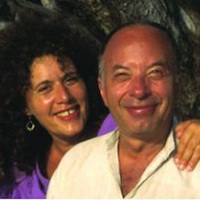We once hosted a TV series in England called Chill Out.
One of our fellow TV presenters seriously upset the camera crew when they arrived at his house. He was rude and dismissive, essentially putting himself on a pedestal and treating them like lowly workers. Minutes later, when the camera was turned on, he became the perfectly smiling spiritual icon he was publicly known to be. But, as the crew told us later, he had already shown them how he did not walk his talk.
In contrast, Ed and our TV producer Jo were in London. Having just interviewed the Dalai Lama, they went into a small café. If you have ever been to London you know that in such cafés the tables are close to each other. Two well-dressed men sat down next to them, which effectively meant they were sharing the same table. Ed introduced himself as coming from the Bronx and one of the men said they were from South Africa. Quite spontaneously Ed then asked if they knew Nelson Mandela. The man pulled out his business card, which showed that his name was Jacob Zuma who, at the time, was President of the ANC but who is now President of South Africa. Ed gave him a book that we had written with contributions from President Gorbachev, the Dalai Lama, and Bishop Tutu. Jacob said the book would be in the hands of Nelson Mandela the following evening.
Usually, if you sit next to someone in a big city café, they do not even make eye contact, let alone conversation. Jacob had never met Ed before but treated him in a friendly, gracious manner. He could have been distant and polite, and he certainly did not have to maintain communication, which he did over the following few years. He even hugged Ed as they parted! In this way, Jacob displayed no sense of discrimination or elitism.
How we walk our talk shows far more than just our public behavior.
It highlights how we view the world and our place in it. From a Buddhist perspective, making friends with our world is an integral part of the path.
But not everyone thinks this way. A few days ago a friend was telling us that a business agreement she had been nurturing for over three years had abruptly come to an end. “He wanted to exclude me from part of the discussion, which I said wasn’t agreeable. So he said that was that, and he got up and left.”
Instead of being shattered after losing all the years of work, she felt relief. He had shown her his true colors. As she said, “He showed me how he treats the waitress.”
Many years ago we met with the Dalai Lama at his residence in India. While we waited for the meeting Ed was standing on the veranda, enjoying the beauty of the mountains stretching out in front of him, when he saw a monk at the far end of the veranda trying to get his attention.
He was beckoning for us to come. We thought he would bring us to our meeting but as we came closer to the monk we realized that he was the Dalai Lama. In traditional Buddhist custom, we immediately began to prostrate but he took our hands and lifted us up, saying, “No, no, we are all equal here.”
That teaching stayed with us. As Deb first thought:
Oh sure! You are the great Dalai Lama, spiritual leader to millions. How can we possibly be equal? But over the following months I felt his words in the core of my being and experienced the true equality he was referring to: the equality of our shared humanness and, simultaneously, our shared heart.
For Ed it was an equally significant moment as, from then on, barriers between people just seemed to drop away: It felt like a great relief. Like no one was more or less important. But it was actually a cellular experience: my whole view of life had changed forever. He realized that there is no difference between anyone. All people want a happy life, whether a doctor, a waitress, a king, a politician, or a bathroom attendant.
The Dalai Lama showed us how he treats a waitress—with the impartiality, consideration and respect that he treats all beings.
No matter who we are, whether a street cleaner or a president, we are all here together as one human family. We spent almost an hour with His Holiness and he made us feel as if he were our dearest friend.
That is called walking your talk!
 Share on bsky
Share on bsky





Read 17 comments and reply